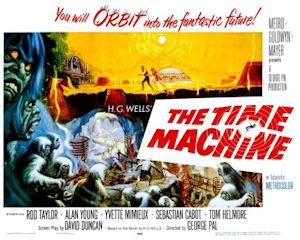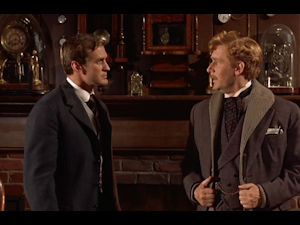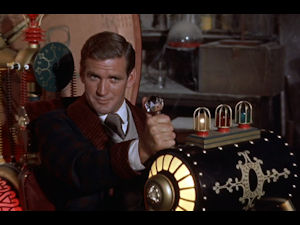The Time Machine (1960) - Sci-Fi Classic Film Review
 | | I wish they still made posters like this for every movie |
One time when I was both very young and very sick, I asked my father to tell me a story. My mother was working hard hours those days, and though he hadn't told me a bedtime story since I was almost a baby, he decided to recite the tale of The Time Machine from memory. He told me of the Morlocks and the Eloi, and I was rapt, begging him to tell me more. For an hour or so, I wasn't sick or bedridden; I was trapped with the nameless Time Traveler in the distant future, fighting those dastardly underground cannibals. The next day, Dad ran out to the video store, picked up a copy of 1960's The Time Machine, came home, set me on the couch under a sea of blankets, popped the rental in the VCR, told me it was one of his favorite sci-fi flicks, and then watched it with me.
It's one of the best memories of my childhood, so you'll forgive me if I lack objectivity here. George Pal's adaptation of Wells' first novel is a bonafide classic, and I'll entertain no arguments to the contrary.
Therefore, rather than offering a standard review where I weigh pros and cons and evaluate the movie according to an esoteric evaluation of film techniques, execution, and plot development--something I don't think I can do fairly given my emotional connection to it--I'm going to look at how the film compares and contrasts to H.G. Wells' original novel. I find this particularly interesting because the film is both surprisingly faithful and annoyingly divergent, both smoothing out some of the story's wrinkles and upending some of its best features. (Incidentally, if you missed last week's review of the novel, you should probably read that first.)
 | | For people of my generation, this is an alternate universe version of Robin Williams (Rod Taylor) arguing with Scrooge McDuck (Alan Young) about the plausibility of time travel |
Let's start with the similarities, the places where the movie is at its most faithful to the book. It preserves the overall structure, starting with the framing device that slowly eases audiences into the central concepts in order to make the story a little more palatable. The setting is similar: it begins in the late Nineteenth Century (granted, it's a handful of years later, but nothing drastic), and it goes to the year 802,701, all in England (the film moves from Surrey to London, but again, not too drastic). The movie also maintains the book's tone of adventure, occasionally interrupted by serious moments of social and philosophical reflection. Perhaps the most unexpected thing the film keeps is the downbeat, ambiguous ending in which the Time Traveler's ultimate fate is probably not a happy one.
The effects work has fun realizing the imaginative scribblings of the novel, highlighted by matte paintings and stop-motion animation that, while laughable today, are pretty great for 1960. Where the low budget really shows are in the cheap sets, many of which look goofier than sets from the original Star Trek, most notably the climactic Morlock cavern set. And while the Eloi's minimalistic costumes and the Morlock's overall look are true to their descriptions, they come across as painfully hokey. Still, all sins are forgiven by the titular time machine itself, a "contraption" that is never really described in the novel but which is realized here as something so intricate and iconic that, nearly six decades later, it's instantly recognized even by people who've never seen the movie.
So now let's get into the differences, beginning with the most obvious one: this is a movie with an extremely heavy-handed message about the evils of war, especially nuclear war. Given the fears of the time, this is hardly shocking--nuclear panic is one of the most prevalent themes in science-fiction cinema throughout both the fifties and sixties--and it's handled in a way that makes logical sense. I'd even call clever the recontextualizing of Wells' future as the long-term result of nuclear war. Unfortunately, by making it so abundantly clear (the "rings that talk" remove all ambiguity), the film loses one of the novel's best attributes: its thematic flexibility. H.G. Wells' novel has maintained a long academic life, largely because its ideas are open-ended enough to permit multiple interpretations and analyses, but the film doesn't have that.
 | | The mannequin he's looking at is one of my favorite little additions |
Its other deviations are easier to accept, though. For instance, the omission of the even more distant future--where the Time Traveler sees the final days of Earth's existence--is a wise decision. For a novel, such a digression after the climax is perfectly fine, but in a movie, it would feel weirdly out-of-place and unnecessary. Also, though I love the dated effects and feel the budgetary limitations lend it a certain charm, I don't think there's any way the filmmakers could have pulled it off.
More controversially, though, I also support the romance with Weena, his Eloi companion throughout most of the story. In the novel, the relationship between the Time Traveler and Weena is more akin to an adult caring for a child, and when she is suddenly and unceremoniously killed off, it doesn't affect the Time Traveler too much. In the film, George succeeds in saving Weena and even decides to go back for her in order to help her kind, which is another significant difference: he is more proactive in trying to change the dystopic reality he finds in the distant future. This allows for an explosive climax in which he teaches the Eloi to overthrow their underground masters, and though the wisdom of such action is questionable at best (especially in light of the film's anti-war themes), it makes for a more exciting third act.
There are plenty of other similarities and differences, but rather than getting caught up in the minor details, let's stop here. Every lovingly preserved element serves to honor Wells' story, while every revision is done to make it more cinematic and more digestible for its contemporary audience. While it's not quite as timeless (pun intended) as the book, 1960's The Time Machine is still a masterwork of classic sci-fi cinema. Thank you, Dad, for sharing it with me.
[EDITOR'S NOTE: If you want, you can check out my review of the 2002 version as well.]
-e. magill 9/6/2018
|
|